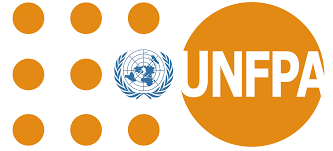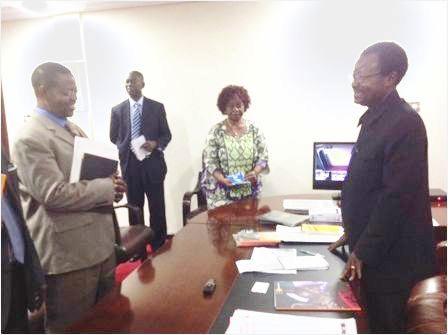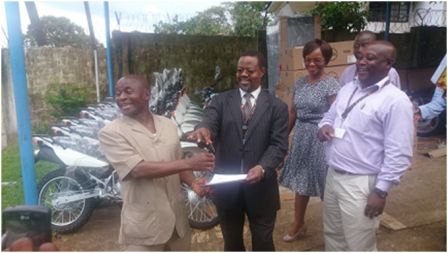UNFPA takes safer sex and reproductive health education to farmers
The United Nations Population Fund (UNFPA) was given the responsibility to strengthen the knowledge and capacity of adolescents and young women and men who suffer from difficulties in accessing Sexual and Reproductive Health information and services. Young farmers that have completed one month training at the United Nations Food and Agricultural Project site at Newton were considered as target group. The UNFPA in collaboration with other partners like National AIDS Secretariat, FAO, Ministry of Health and Sanitation etc, held one-day training for the young farmers on Wednesday 31st October 2012 at the Sierra Leone Agric-Business Initiative (SABI) Center at Newton. (Photo: A cross section of participants )
The objective of the training was to enable beneficiaries of the FAO project gain access to quality gender-sensitive youth-friendly reproductive health information and have a better knowledge on the benefits of engaging in safer sexual behavior. Topics covered during the training include: sexual and reproductive health and rights – general information, family planning, other sexual and reproductive health services, gender-based violence, and HIV and AIDS.
Alhassan Kamara is UNFPA’s Programme Analyst, Adolescent Sexual Reproductive Health. He admonished participants to share knowledge gained in their localities so as to effect the necessary changes in misconceptions on reproductive health, safer sex and other health related issues. He admonished them to take family planning issue with all seriousness for a better family living and life-saving at all times.
The Adolescent and Young People’s Health Focal in the District Health Medical Team (Western Area), presented the topic: “Other sexual and reproductive Health Services”. Festus Pessima informed participants that adolescent and young people continue to die at child birth, teenage pregnancy rates appear to be on the increase, school retention rates continue to be lower than school enrolment, drug abuse and mental problems amongst adolescents abound and access to adolescent and youth friendly services and information remain a challenge in the country. He noted that adolescent have diverse needs, which the UNFPA/UNICEF/WHO framework for action classified in four categories. These include: need for appropriate information and life skills for informed consent, need for adequate services, need for safe environment, and need for opportunity to participate in finding solutions to their health problems. “The sexual and reproductive health service needs of adolescents are correspondingly heterogeneous. Adolescents who are not yet sexually active have different needs from those who are; sexually active adolescents in stable, monogamous relationships may have different needs from those in more casual relationships,” he said. “What is needed is a process by which government ministries can make decisions about what most appropriate for their situation, taking into account cost, epidemiological factors and adolescent development priorities,” says Mr. Pessima.
The Deputy Director of National AIDS Secretariat, Abdulrahman Sesay presented presented the HIV prevention in the context of the world of work. He reiterated the fact that HIV and AIDS issues are very important in occupational safety and health. He noted that 85% of HIV infection is through sex, and added that participants should not take the risk of having unprotected sex. Mr. Sesay admonished them to be role models in championing condom use in their localities in order to save lives. He called for the need to have a safe and healthy environment for all workers, including those with occupational risk of transmission and other safety measures.
Millicent Senessie is a Senior Outreach Nurse at Marie Stopes in the Western Area. She described family planning as a process when individuals and couples plan and attain their desired number of children and the spacing and timing of their births, taking into consideration their income and where they live. Family Planning, she said reduces neonatal, infant, child and maternal deaths; prevents STIs and HIV and AIDS; reduces social and economic inequalities; increases life expectancy; reduces poverty; contributes in achieving the Millennium Development Goals etc. She described condom as the most popular method of contraceptive that prevent unwanted pregnancy and STIs. “A lot of misconception is attatched to family planning. Please report to the nearest family planning clinic if you have any doubt,” the Senior Outreach Nurse says.
A presentation on gender-based violence was made by the Acting Deputy Director in the Directorate Office of the Ministry of Social Welfare, Gender and Children’s Affairs. Goodie Sowonie admonished participants to see men and women as partners that contribute to the development of the family, community and country as a whole. She warned against the frequent violation of women’s right, of which the Ministry has put in place the Sexual Offences Act that condemns the practice. “Men and women should enjoy equal opportunities at all times,” she added.
Ortorkor Janaba
Stay with Sierra Express Media, for your trusted place in news!
© 2012, https:. All rights reserved.







Erica
/
UNFPA takes safer sex and reproductive health education to farmers: Young farmers that have completed one month … http://t.co/FLGU6m5K
2nd November 2012